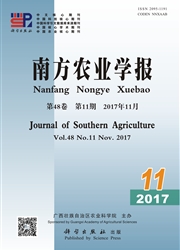

 中文摘要:
中文摘要:
【目的】分析棉花秸秆的拉伸力学性能,为其在砌体结构中的应用提供理论依据。【方法】采用电子万能试验机测定棉花秸秆不同品种、不同生长部位和不同含水率的抗拉强度及不同品种、不同含水率的弹性模量,研究其抗拉强度和弹性模量的变化规律。【结果】棉花秸秆抗拉强度和弹性模量受品种影响较小;在含水率近似相等情况下,棉花秸秆各部位的抗拉强度由根部向稍部逐渐降低;含水率为50%~75%的棉花秸秆抗拉强度最大;干棉花秸秆平均弹性模量大于含水棉花秸秆平均弹性模量;干秸秆平均弹性模量范围为2.38~6.33 GPa,含水秸秆平均弹性模量范围为1.22~2.83 GPa。【结论】含水率是影响棉花秸秆抗拉强度和弹性模量的主要因素,应作为配棉秆植物筋砌体结构应用的拉伸力学性能首选参数。
 英文摘要:
英文摘要:
【Objective 】The tensile mechanical properties of cotton stalks were analyzed to provide theoretical refer ences for its application in masonry structure. 【 Method 】 The tensile properties of different varieties, different parts and different moisture contents were tested using microcomputer control electronic universal testing machine to study the variation rule of elastic modulus and tensile strength. 【Result 】The tensile strength and elastic modulus were hardly affected by the varieties. The tensile strength of each part of cotton stalks under the same moisture content reduced gradually from the root to the end. The tensile strength of cotton stalks was the maximum when the moisture content of cotton straw was in the range of 50% to 75%. The average elastic modulus of dry cotton stalks was greater than that of wet cotton straw. The average elastic modulus of dry straw was in the range of 2.38 to 6.33 GPa, while the average elastic modulus of wet straw was in the range of 1.22 to 2.83 GPa. 【Conclusion】The moisture content of cotton stalks, the main factor affecting tensile strength and elastic modulus of cotton stalks, should be applied as the top parameter of reinforced masonry structure.
 同期刊论文项目
同期刊论文项目
 同项目期刊论文
同项目期刊论文
 期刊信息
期刊信息
